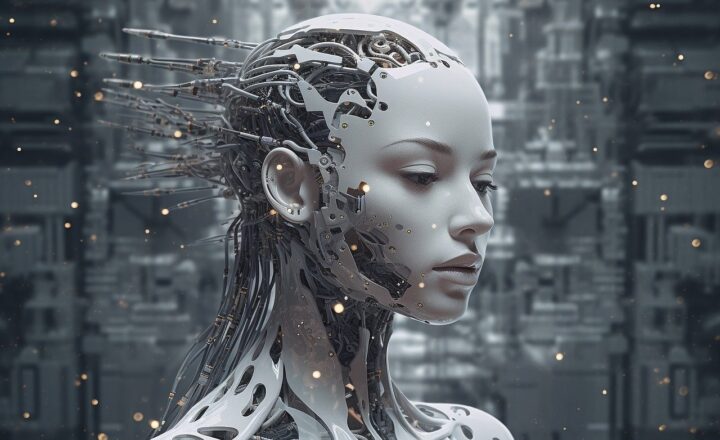How AI is Revolutionizing Our Lives: 5 Mind-Blowing Examples
November 18, 2024

Artificial Intelligence (AI) has transformed how we live, work, and interact. As the technology advances, AI has become a fundamental part of our daily lives, improving efficiencies and creating new possibilities that were once the stuff of science fiction. In this article, we will explore five mind-blowing examples of how AI is revolutionizing our lives in unprecedented ways.
—
### 1. AI in Healthcare: Revolutionizing Diagnostics and Treatment
AI is making significant strides in healthcare, particularly in diagnostics and treatment planning. With vast amounts of medical data available, AI algorithms can learn from past cases to predict outcomes, streamline treatments, and even suggest preventative measures.
For example, IBM’s Watson can analyze the meaning and context of structured and unstructured data in clinical notes and reports. Here’s how AI is reshaping healthcare:
- Enhanced Diagnostics: AI systems can analyze medical images with impressive accuracy. For instance, Google’s DeepMind has developed an AI that can diagnose eye diseases as accurately as the best experts by evaluating retinal scans.
- Personalized Treatment Plans: By analyzing patient data, AI can suggest personalized treatment plans that consider individual health conditions, genetic information, and even lifestyle habits.
- Predictive Analytics: AI can help predict disease outbreaks and patient admissions, aiding hospitals in resource management and reducing wait times significantly.
As a result, AI not only enhances the accuracy of medical diagnoses but also paves the way for personalized medicine, ultimately leading to better health outcomes.
—
### 2. AI in Transportation: The Future of Mobility
Transportation is another area where AI is making remarkable advancements. With the rise of self-driving technology, AI has the potential to revolutionize how we travel, making it safer and more efficient.
Consider the following innovations in smart transportation:
- Autonomous Vehicles: Companies like Tesla and Waymo are at the forefront of developing self-driving cars. These vehicles use AI to navigate roads, avoid obstacles, and make real-time decisions, potentially reducing traffic accidents caused by human error.
- Traffic Management: AI systems can optimize traffic flow by analyzing data from cameras and sensors installed throughout cities. This can lead to reduced congestion and improved travel times.
- Ride-Sharing Services: Platforms like Uber utilize AI algorithms to match riders with drivers, setting optimal routes, and predicting demand. This enhances the user experience and increases efficiency in urban transportation.
AI is steering the future of transportation towards greater reliability and convenience, heralding a new era of mobility.
—
### 3. AI in Education: Personalizing Learning Experiences
The education sector is embracing AI’s potential to reform traditional learning methods. By delivering personalized learning experiences, AI can cater to individual student needs and preferences.
Here are some examples of AI’s impact on education:
- Smart Tutoring Systems: AI-powered tutoring programs like Carnegie Learning can adapt lessons based on students’ performance, providing a tailored educational experience that addresses their strengths and weaknesses.
- Administrative Efficiency: AI can automate administrative tasks such as grading and scheduling, allowing educators to focus more on teaching and mentoring their students.
- Virtual Teaching Assistants: Chatbots and AI personal assistants can provide 24/7 support for students by answering questions and providing resources, making learning accessible at any time.
With AI’s assistance, the educational landscape is shifting towards a more personalized and efficient approach, ensuring that students receive the support they need to succeed.
—
### 4. AI in Finance: Transforming Financial Services
The financial industry has rapidly adopted AI to enhance security and increase operational efficiency. AI-powered systems are capable of analyzing massive datasets to make informed financial decisions.
Key components of AI’s influence in finance include:
- Fraud Detection: AI algorithms are designed to detect unusual patterns in transactions, taking preventive measures against fraud before it occurs.
- Robo-Advisors: Automated investment platforms use AI to provide personalized investment advice and portfolio management based on individual user profiles and risk tolerance.
- Credit Scoring: AI-based models offer alternative data analysis methods that enable lenders to evaluate creditworthiness more accurately, allowing them to make better lending decisions.
With AI in finance, institutions can respond to customer needs faster, mitigate risks, and improve overall service efficiency.
—
### 5. AI in Daily Life: Enhancing Everyday Experiences
AI is seamlessly integrating into our daily routines, enhancing how we interact with technology and each other. Here’s how:
- Virtual Assistants: Tools like Amazon Alexa, Google Assistant, and Apple’s Siri are powered by AI, enabling users to control smart home devices, set reminders, and answer queries using voice commands.
- Personalized Recommendations: Streaming services and e-commerce platforms use AI algorithms to deliver personalized content and product recommendations based on user preferences and behavior.
- Smart Home Devices: AI technology powers smart thermostats, security cameras, and home appliances that learn user habits to optimize energy usage and enhance safety.
From entertainment choices to home automation, AI enriches our everyday experiences, making life more convenient and enjoyable.
—
### Conclusion
AI is profoundly transforming various facets of our lives, paving the way for future innovations that promise to enhance health, mobility, education, finance, and daily living experiences. As we stand on the cusp of this technological revolution, embracing AI’s potential will be crucial for both individuals and society as a whole. By understanding and leveraging these advancements, we can ensure that AI serves as a force for good, driving positive change across all dimensions of life.







